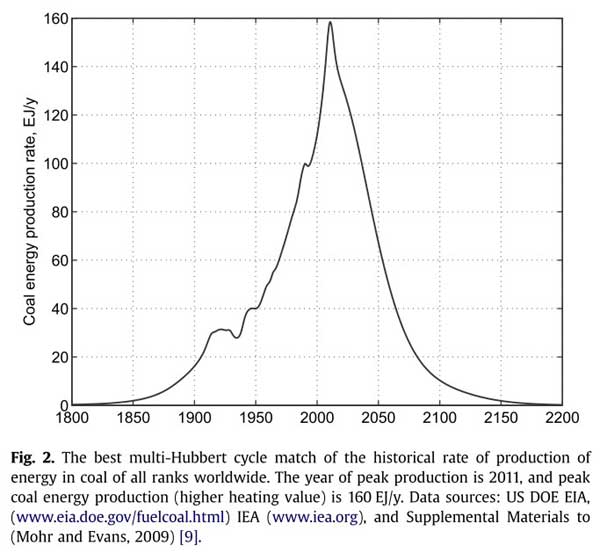What If There’s Much Less Coal Than We Think?
By David Roberts
19 August, 2010
Grist.org
How much coal is there in the world?
It's tough to think of a more important question for the next half-century. The answer will play a huge role in shaping public policy and directing capital investments. So we've got it pretty well nailed down, right?
Turns out, maybe not.
The prevailing conventional wisdom is that the U.S. has a "200-year supply" of coal -- sometimes jacked up to "400-year" by industry enthusiasts. If that's true, there's obviously an enormous incentive to build the infrastructure to keep using it. Such is the essential argument for carbon capture and sequestration: coal will always be abundant and cheap, so we "have to" keep burning it, so we have to find some way of burying its carbon pollution.
But what if we're overestimating the amount of coal left? What if it's actually going to get scarce and expensive in the near- to mid-term?
If that's true, it has huge, huge implications. Two in particular:
1. If coal is soon going to get harder to reach and more expensive, an enormous investment in carbon capture and storage may not make sense. Remember, building the infrastructure necessary to run our economy on renewables and efficiency will itself be an expensive, energy-intensive undertaking. If our fossil-fuel savings are running low, we urgently need to spend every penny of that energy wisely. If we waste a huge chunk of it on CCS only to find coal drying up, we'll have that much less to put toward building post-fossil infrastructure.
2. If there's much less coal than widely assumed, climate change may not be humanity's biggest problem. Most of the more dire IPCC climate change scenarios assume endlessly rising energy demand and use, and thus endlessly rising CO2 emissions. But those models tend not to pay heed to the physical world. If some of the new research on coal reserves is accurate, it is mathematically impossible to emit as much as the high-end IPCC scenarios. There just won't be enough fossil fuels.
Now, this latter point needs to be made carefully. There's almost certainly enough coal left for us to do the atmosphere (and by extension, ourselves) serious damage. But the really epic crash may not be in the climate, it may be in human civilization, which is by now entirely dependent for its growth and complexity on relatively cheap, relatively abundant fossil fuels. The absence of extreme global warming will be of little comfort if we end up in a post-apocalyptic Mad Max hellscape.
------
Briefly, let's look at the latest research on coal reserves. The current issue of the scientific journal Energy contains "A global coal production forecast with multi-Hubbert cycle analysis," by Tad Patzek and Gregory Croft. (Just the name gives you a tingle, right?) It's somewhat technical, but the main point is fairly clear: A realistic look at coal reserves yields grim results.
The authors argue that stated coal reserves are a poor guide to actual, recoverable coal. Reserve numbers have been inflated for years; every time someone's taken a close look, they've been revised sharply downward. Instead, Patzek and Croft propose to use historical production data to build a Hubbert curve, a familiar analytic device that's often applied to oil reserves (and is the basis for "peak oil").
Long story short:
The global peak of coal production from existing coalfields is predicted to occur close to the year 2011. ... After 2011, the production rates of coal and CO2 decline, reaching 1990 levels by the year 2037, and reaching 50% of the peak value in the year 2047. It is unlikely that future mines will reverse the trend predicted in this BAU scenario. [Emphasis mine.]
Here's a visual on that:

Tadeusz W. Patzeka and Gregory D. Croft, "A global coal production forecast with multi-Hubbert cycle analysis"
The curve for CO2 emissions from coal looks roughly similar -- peaks soon and plunges.
Just to avoid a frequent misunderstanding: This doesn't mean the world is going to "run out of coal." It simply means that most of the easily reachable coal has already been reached. Going forward, supplies will be more difficult to reach, lower in quality, and/or more expensive to transport. The combination of those factors means that new supply won't be able to keep up with the drop-off in old supply; overall production will peak and decline. As it does, prices will rise sharply.
Now, for those of you without a calendar: 2011 is soon! Think about it: 40 years from now, despite growth in population and energy demand, there will be about half as much coal available as there is now. That's a big relief for the atmosphere but serious trouble for, y'know, people.
------
I don't have anything near the mathematical chops to know who's right in this dispute about coal reserves. But given that it's pretty much the most important f'ing thing ever, it seems like it deserves a lot more attention from scientists and politicians. Some further reading:
Here's another post I did exploring the subject in more detail: Blackout: Heinberg on dwindling coal reserves and the siren song of “clean coal.” Of course it's well worth reading Heinberg's book, too, as it gathers much of the current research.
Here's a good two-parter on the subject from Joe Romm:
U.S. coal supply may last only 10-20 years
The entire ‘clean coal’ effort could be fruitless
CalTech professor David Rutledge has done tons of original work on this. You could watch his 2007 lecture on the subject or read his post on The Oil Drum, "The Coal Question and Climate Change."
If you've read other good stuff on the subject, leave it in comments.

